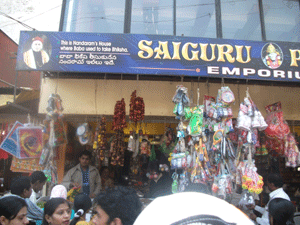|
. Nandaram was a rich landowner and moneylender by profession. But he was kindhearted and a gentle person. His grandfather came to Shirdi from Rajasthan (Kharade village) and Nandaram was born in 1866 and grew up in Shirdi. He came close to Baba in 1875, and his devotion increased by leaps and bounds. In fact, he spent most of his time with Baba. Nandaram's house was one of the five blessed houses that Baba took Biksha from. It is said that Baba would visit this house last although it was very near to the Dwarakamai, almost in front of it. Baba loved this family and He would call out to Nandaram's wife Radhabai who had a speech problem. Baba would say "Oh, Bhopadi Bai, Biksha de". If she was late in offering Biksha He would shower abuses on her and return to the Dwarakamai. Baba sometimes asked her to make Puran Polis (Wheat chapathis filled with sweet stuffing of Channa Dal) and a full meal. After making all the preparations she would take the thali to the Dwarakamai, but Baba would eat very little and distribute the rest. Radhabai was devoted to Baba. She knew Baba’s abuses were blessings in disguise. Every Diwali she got five yards of white Manjarpat (coarse cotton) and stitched a Kafni for Baba, and presented it to him. Baba wore it immediately with great joy and happiness. In 1911 when plague was rampant in Shirdi the villagers quickly started fleeing. Nandaram met some of the villagers who remarked that his eyes were red with fever and that was the first sign of the plague. He was startled to hear this and went on horseback to take Baba's permission to leave and go to his village Ekruka. Baba dissuaded him from leaving. He assured Him that he was not going to die. "I will not let you die till I die" and gave him Udi and he recovered. On another occasion there was a terrible sickness, and many villagers were seriously ill with it. It was believed that sugar was not to be ingested during the illness. Those who did ingest sugar were gravely sick and some lost their lives. Nandaram was also afflicted with the disease. When he noticed the first signs of the disease, he went straight to the Dwarakamai and sought refuge at Baba’s feet. Baba took out a packet of sugar from his pocket and gave it to him. Nandaram had utmost faith in Baba, so he at it at once and recovered. Nandaram's grandmother asked Baba to look after her family, as the male children died in infancy. Baba gave her three mangoes and she got three sons. After this “Aam leela” all the male children survived. The best deed that Nandaram did was to donate the land that was between Butti Wada and Dwarakamai for Baba's use. This deed was done through Damu Anna and hence the Samadhi Mandir was extended. Nandaram believed in doing good, in giving rather than receiving. He also repaired and made the flooring of Maruti and Ganesh temples. He died on 13th October 1946. His philanthrophic and social work is carried on by his descendants (As narrated by Nandaram’s grandson Dilip Sanklecha to the author). A Commercial Complex has now come up in the place where Nandaram Marwari Sanklecha's house was present.
|

